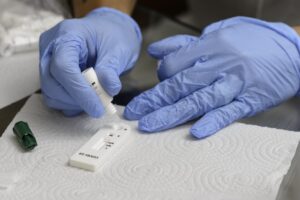
The Global Fund’s COVID-19 Response Mechanism (C19RM)
First established in April 2020, the Global Fund’s COVID-19 Response Mechanism (C19RM)
As advocacy and awareness efforts are ongoing, in-vitro diagnostic (IVD) tools and technologies need to be introduced and integrated into health systems to help protect people and communities. Scaling up and sustaining the use of IVD tools require strong, resilient diagnostic lab systems and infrastructure. Strengthening these systems enables countries to provide timely testing, linkage to care, deployment of countermeasures, tracking of disease, and identification of new variants.
The COVID-19 pandemic revealed the fragility of health systems across the globe at all levels of care, which was partly a consequence of historic under-investment in diagnostics and more broadly, in public health systems. Even as countries built demand for tests and tests became available, insufficient laboratory and surveillance systems, a lack of trained health workers, and centralized testing facilities meant that decision-makers often struggled to implement timely testing strategies. Despite the demand for IVD tools, particularly molecular and antigen-detection rapid diagnostic tests AgRDTs, reaching unprecedented levels, systemic challenges resulted in communities being unable to access the tools and technologies needed for testing, treatment, and surveillance.
As molecular and AgRDTs for both professional use and self-testing became available in country, partners worked to expand uptake of these tests by strengthening health systems to bring testing closer to patients.
With the support of partners, the following key activities were prioritized to support scaling up and sustainability efforts:
Investments in scaling up and sustainability efforts have led to stronger health systems for countries, including expanded laboratory and surveillance networks. There is now greater visibility on the value of testing, and greater demand for testing has increased decentralized models of care, bringing services closer to patients. Notable scaling up and sustainability achievements are highlighted below. To learn more about the scale and sustainability achievements and work, refer to the learnings and resource section below.
low and middle income countries received catalytic funding for COVID-19 testing demand generation
healthcare workers trained in nearly 200 countries
awarded by Global Fund to train staff and community health workers across all pillars via C19RM
awarded by Global Fund to support in-country roll-out of diagnostic tools via C19RM
operational research studies implemented to expand testing within diverse community settings in 12 countries
of WHO member states have SARS-CoV-2 virus sequencing capability (146 out of 190 member states with available information)
Leveraging the ACT-Accelerator experience, there are key lessons to expand the use of diagnostic tools and technologies for COVID-19 as well as other diseases of endemic and pandemic potential.

First established in April 2020, the Global Fund’s COVID-19 Response Mechanism (C19RM)

The SARS-CoV-2 antigen rapid diagnostic test community health worker (SARS-CoV-2 Ag RDT
© All Rights Reserved 2023
The ACT-A Dx Knowledge Hub is hosted by FIND on behalf of the ACT-Accelerator Diagnostics Pillar partnership.